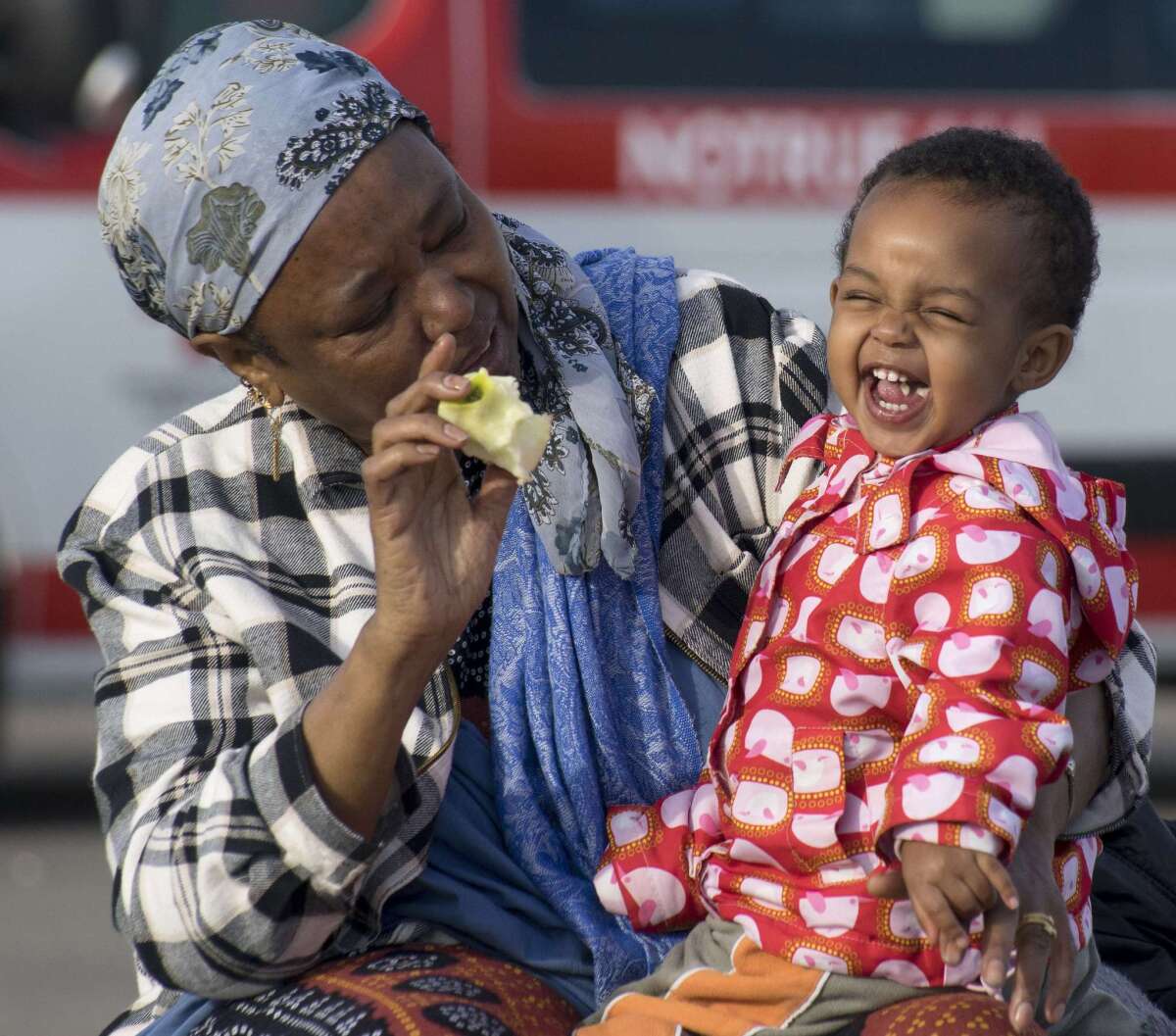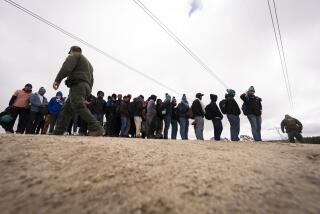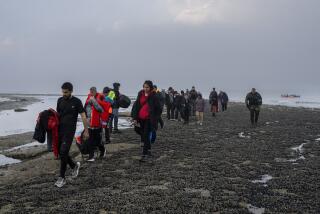Europe’s forgotten migrants -- the ones who aren’t from Syria

Sara, a 1-1/2-year-old migrant girl from Somalia, eats an apple in the arms of her grandmother at a refugee camp near Nickelsdorf, Austria, near the Hungarian border, on Wednesday.
- Share via
reporting from berlin — They’ve made it all the way to what most asylum-seekers consider the promised land – but many fear the gates of Germany will ultimately be closed to them.
Migrants from countries other than Syria – including those from Afghanistan, Pakistan, Eritrea, Somalia and the Balkan states – make up a substantial share of the extraordinary crush of humanity aiming to reach Germany and other wealthy northern European havens in the waning weeks of summer.
But many are well aware that in the eyes of the authorities, their cases are more ambiguous than those fleeing Syria’s civil war, now in its fifth year. And in overflowing camps and refugee centers, knowledge of this differing status can breed bewilderment and resentment.
“I’m really worried about my asylum application because Syrians are getting the priority ahead of refugees from all other countries,” said Hazzaz Ahmed, 23, who arrived in Germany last week from Pakistan.
“It’s just as dangerous in Pakistan – we have many extreme radical Islamist groups, and each has a different ideology, and they are fighting each other,” said Ahmed, who said he fled after suffering a shrapnel wound in a suicide bombing.
“I saw people die before my eyes, and pieces of their bodies were scattered,” he said. “That’s why I decided to come to a place that would be safe.”
The European Union, which is weathering bitter internal disputes over how to cope with the migrant crisis, is trying to develop a common list of so-called “safe countries,” whose nationals would stand relatively little chance of being granted asylum. As it stands, those designations are now applied unevenly across the 28-member bloc, and also in European states that are not part of the EU.
See the most-read stories this hour >>
Last year, 95% of Syrian applicants were granted protection and allowed to stay on in the EU, according to figures compiled by the bloc’s executive branch. Iraqis, Afghans and Eritreans were also recognized in significant numbers, but for them, the process is fraught with greater uncertainty.
“It’s not safe anywhere in Afghanistan, even Kabul,” said Yakibe Ali, who comes from volatile Ghazni province, much of which is in the hands of the Taliban. He arrived four months ago and was still waiting for word on whether his asylum application was moving forward.
Ali said, though, that he had nothing against the Syrians, even if their bids to secure protection are more swiftly dealt with, and more successful overall.
“People who are coming from wars in any country are entitled to look for a safe place to live their lives,” Ali said. “Hopefully, we can all have a place here together.”
Of those making up the current surge of migrants, prospects are worst for those fleeing impoverished Balkan countries like Albania and Kosovo, whose rate of acceptance hovers at around 6% or less. Many of those now here fear that their applications will be summarily dismissed as German authorities work to clear an enormous backlog to make way for new arrivals.
During a weeklong window earlier this month in which Germany essentially opened its borders to all, regardless of where they first reached European territory, thousands of migrants and refugees streamed in undocumented. The reimposition of border checks on Sunday, described as a means of restoring “order” to the admission process, was meant in part to discourage opportunistic entry from the nationals of Balkan states.
“Back home soon, I am afraid,” a nearly toothless Kosovar Albanian man said sadly as he waited outside a Red Cross-run refugee facility in the former East Berlin, fingering the white wristband administered to camp residents.
In Hungary, which essentially sealed its border with Serbia on Tuesday, authorities were taking only minutes or even seconds to decide whether to turn people back, asylum-seekers and aid groups said, with many national and ethnic groups getting particularly short shrift.
NEWSLETTER: Get the day’s top headlines from Times Editor Davan Maharaj >>
German Chancellor Angela Merkel and members of her government have been sharply critical of Hungary’s policies, but have also drawn a clear distinction between those fleeing war and persecution, and those who simply want to better their economic lot.
Even Syrians who are grateful for the official recognition of their plight say the asylum process is daunting, particularly for the latest of the newcomers seeking to make their way through an already overburdened bureaucracy. Aznoor Lotfy, who arrived in Germany two months ago after fleeing the Syrian countryside near Damascus, said he was able to quickly begin the registration process.
“Now things are different because of the big numbers coming,” he said. “My aunt arrived last week, and she was told that just to take her fingerprints would take a month. I was lucky—I did that in two days.”
EU countries on average try to make asylum decisions within nine months, and a new measure being weighed would call for a six-month maximum across the bloc.
Out on the migrant trail, reports have surfaced of travelers from countries such as Bangladesh throwing away their documentation in hopes of passing for Syrians. But any such ruse is likely to be short-lived, even in the case of, for example, an Arabic speaker from a North African country claiming to be Syrian. Asylum seekers whose origins are in doubt can be recorded speaking in their native tongue, which can be checked by experts for speech patterns and accents.
Even some who feel their own cases merit more attention are sympathetic to the dangers faced by those remaining in Syria. Adel Hussein, a Shiite Muslim from the Iraqi holy city of Karbala, was particularly attuned to the perils of ethnic and sectarian strife in his own country.
“In Iraq, people get killed every day just because of their name,” he said, referring to chilling episodes in which Shiites have been singled out by Sunni extremists and killed on the basis of the name on their ID cards.
But because of Iraq’s proximity to the Syrian conflict, he said he understood well the multiple perils of daily life there—indiscriminate government bombardment of rebel-held areas, terror at the hands of the extremists of the Islamic State and vicious infighting among militias competing for dominance, in which civilians are often caught up.
About a quarter-million Syrians have been killed in the course of the war.
“I know the German government is giving priority to the Syrians,” Hussein said. “It is bad in Iraq, but worse in Syria—people are dying every day. So I understand why they come first.”
Follow @LauraKingLAT on Twitter.
MORE ON EUROPE’S MIGRANT CRISIS
What will be the next European bottleneck for migrants?
A new Charlie Hebdo furor: Did cartoons mock a drowned Syrian boy?
Hungary shuts border crossings, triggering standoff with stranded migrants
More to Read
Sign up for Essential California
The most important California stories and recommendations in your inbox every morning.
You may occasionally receive promotional content from the Los Angeles Times.










